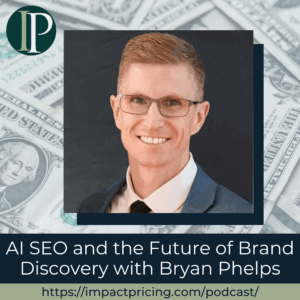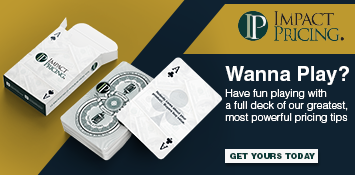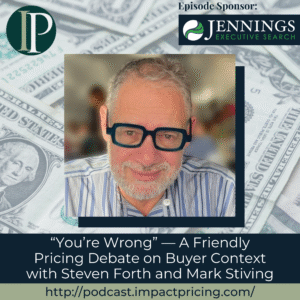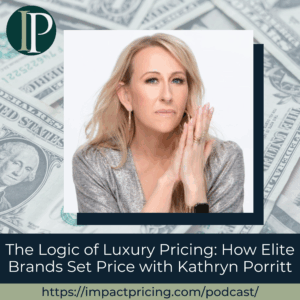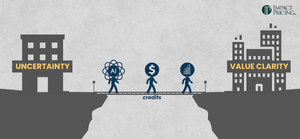Bryan Phelps is the founder and CEO of Big Leap, a digital marketing agency he’s been running for 17 years. He’s been working in digital marketing and SEO since college and recently served as a juror in a murder trial (though we don’t discuss that). Bryan specializes in helping B2B tech companies and professional services firms navigate the evolving landscape of AI-powered search and discovery.
In this episode, Bryan reveals how AI is fundamentally changing SEO and digital marketing, why traditional performance marketing tactics are becoming less effective, and how companies can build “brand-led performance marketing” strategies that work across Google, AI platforms, and future technologies.
Podcast: Play in new window | Download
Why you have to check out today’s podcast:
- Learn the key differences between B2B and B2C buyer behavior in the age of AI search.
- Discover the three pillars of AI SEO and how they relate to traditional search optimization.
- Understand why building relationships with the 95% of non-shopping audiences creates pricing power.
“A lot of value is created before you ever start a pricing conversation. So that’s how we’re trying to help our clients shift a bit, not just focus on that 5% of people that are in the market and then compete on price.”
– Bryan Phelps
Topics Covered:
01:40 – B2B vs B2C SEO differences: How buyer journeys vary from research-heavy B2B to purchase-ready B2C audiences
04:08 – AI SEO and discoverability strategies: Understanding where audiences search and optimizing for multiple platforms beyond Google
07:44 – AI recommendations and SEO strategy overlap: How AI’s “query fan out” method connects Google rankings to AI search results
12:18 – Brand element and popularity component: Why being recognized as an industry authority matters more than broad household recognition
15:05 – Brand-led performance marketing shift: Moving from link-based to mention-based strategies in the post-tracking world
18:45 – Brand ideology and differentiation process: How to define unique viewpoints and align with genuine audience connections
20:22 – AI’s impact on content creation: Why long-tail content is losing value and expertise-based content is gaining importance
25:56 – Pricing advice for businesses: Building value with non-shopping audiences to reduce price sensitivity and competition
27:02 – Staying informed in marketing: Bryan’s LinkedIn newsletter for non-marketers navigating industry changes
Key Takeaways:
“The exciting thing for us is I think it’s kind of going back to almost like pre Google. So it really is more of a brand marketing function in a lot of ways.” – Bryan Phelps
“Being known to your audience is ultimately what matters. You don’t have to be the household name, necessarily, but if your audience is just a little bit more niche and specific, you can be the brand in their world.” – Bryan Phelps
“Our goal isn’t to take any company and just try to cover the broadest of brands… we’re trying to ultimately create a brand that aligns with our ideal client.” – Bryan Phelps
“Our goal is to help brands be remembered, not just discovered.” – Bryan Phelps
Resources and People Mentioned:
- Big Leap Digital Marketing Agency: https://bigleap.com
- Kobe Bush: Team member who coined “people notice different” concept
- Query Fan Out: AI method of breaking prompts into multiple searches
- Brand Ideology Process: Big Leap’s framework for unique positioning
- Zero Click Marketing: New measurement paradigm for AI-driven discovery
Connect with Bryan Phelps:
- LinkedIn: https://www.linkedin.com/in/bryanphelps/
- Website: https://bigleap.com
Connect with Mark Stiving:
- LinkedIn: https://www.linkedin.com/in/stiving/
- Email: [email protected]
Full Interview Transcript
(Note: This transcript was created with an AI transcription service. Please forgive any transcription or grammatical errors. We probably sounded better in real life.)
Bryan Phelps
A lot of value is created before you ever start a pricing conversation. So that’s how we’re trying to help our clients shift a bit, is not just focus on that 5% of people that are in the market and then compete on price. How do we build relationships with the 95% of people that are in our audience, but not in shopping mode, and start building value early on in that process. And so, there are quicker sell cycles, less price sensitivity.
[Intro / Ad]
Mark Stiving
Welcome to Impact Pricing, the podcast where we discuss pricing, value, and the recipe-like relationship between them. I’m Mark Stiving, and I run boot camps to help companies get paid more. Our guest today is Bryan Phelps. Here are three things you want to know about Bryan before we start.
He is the founder and CEO of Big Leap, and he’s been doing this for 17 years. He’s been working in digital marketing and SEO since he was in college and started working. And he was recently a juror in a murder trial. Sounds fascinating, but we’re not going to talk about it. Welcome, Bryan.
Bryan Phelps
Yeah. Thanks Mark. Yeah. Maybe we’ll chat after about that whole murder trial.
Mark Stiving
Yeah, there we go. There we go. Hey, so I normally start out with the question, how’d you get into pricing, but obviously you’re not in pricing. So let’s ask a different question. How do you compare SEO in the world of B2B versus the world of B2C?
Bryan Phelps
Yeah, that’s a great question. There’s some similarities at times in terms of how we go about and do things and we work with a lot of great B2B tech companies and startups as well as professional services. And we’ve worked with great e-commerce brands and brands, maybe you wouldn’t think of as e-commerce, but like Avis Car Rental, that’s an online transaction, so they view it as e-commerce.
In terms of similarities, some of the technical stuff that we work on, you know, there’s some similarities, but the buyer experience varies a lot. So in the B2B world, we find a lot more people researching technical solutions, trying to understand, you know, how do I measure this marketing? And so we’ve had a lot of success kind of in that top of the funnel world, like providing information for B2B buyers out there.
With e-commerce, sometimes it tends to be a little bit more, a little closer to that point of purchase where they’re out there ready to buy again from an SEO perspective. And so where we focus our time and content and efforts will change a little bit from maybe top of the funnel to a little closer to the bottom of the funnel for e-commerce.
Mark Stiving
So I just want to repeat what I heard you say to make sure I got it right. And that is when we think of B2B buyers versus B2C buyers, consumers are, you know, typically by the time I’m ready to look, I’m ready to buy.
And so, you’re in that piece of the funnel where in B2B, I’m out trying to figure out what’s the problem I’m trying to solve? What are the different possibilities? How do people write an RFP for this, right? There’s a whole bunch of different questions that we go into.
Bryan Phelps
Yeah, yeah, that’s a great summary. And, you know, there’s elements of the full funnel, I’d say, in both situations. But we’ve found, yeah, those B2B buyers, that’s where we often, again, focusing on SEO as where we can really start this more of that top of funnel.
We do paid search, paid ads, PR, things like that to help really maximize the whole funnel. But speaking about SEO in particular, one of the differences we often see is where SEO fits into that funnel between those two audiences you talked about.
Mark Stiving
All right. For my audience, for my listeners, the reason I wanted Bryan on here is because he’s going to tell us or help us learn more about AI. And I don’t know, do you call it SEO in AI? What do you call it when I’m trying to, I’m trying to get AI to recommend me instead of somebody else?
Bryan Phelps
What do you call that? That’s a hot debate in the industry right now. So there’s probably a group pushing to say, hey, this is just SEO. And maybe the E is something different in terms of searching everywhere optimization. Internally, we refer to it as AI SEO. And so, GEO is a common one. LLM SEO is out there as well.
So, I don’t think we’ve, as an industry, really focused in on one yet. But the big emphasis for us and how we talk to our clients about it is that element of discoverability kind of regardless whether that’s AI or Google or Reddit as a big, you know, destination has its own search built into it now, AI search.
So our emphasis for our clients really is first, let’s understand where your audience is looking for information. Cause that varies across all those platforms I talked about. And second, how do we put together a strong plan to make sure they can be discovered on those platforms?
Mark Stiving
Yeah. And along the lines of the first question I asked you, it feels to me like this is much more important for B2B companies today than B2C companies. Would you agree with that or not?
Bryan Phelps
Yeah, what we’ve seen is the early adopters in the AI world have been that more of the B2B audiences. People are using it for product discovery and recommendations and maybe as a consumer, I’m almost more excited about that because I feel like it’s going to really help us based on what AI knows about us and learns about us.
And our preferences help us really find the right product versus having to compare 10 or 15 out there. But definitely from a usage perspective right now, the B2B world definitely is the early adopter.
Mark Stiving
It’s kind of funny because when I talk to my family, they don’t really use AI, right? So from a consumer perspective, it doesn’t really mean much to them. But every business person I talked to is using AI to some extent somewhere.
Bryan Phelps
Yeah, we’ve definitely seen that too. And we’re seeing, you know, for our own business and for all of our clients. You know, there’s still, if you look at traffic and we have access to view, you know, traffic data across a lot of clients and industries, Google still is driving the bulk of traffic. It’s usually 98 plus percent.
But again, it goes back to what you described a little bit of just knowing that audience too, and where do they search or where do they look for solutions? And so even again, in our B2B clients, it’s still. maybe 2%. That’s probably the highest I think I’ve seen of their traffic coming from AI.
But the kind of asterisk on that is, are people coming to the website? You know, they may be finding you in AI, but maybe they’re not clicking through. So there’s a huge element of discoverability there that maybe isn’t being measured quite yet.
Mark Stiving
And I noticed that AI doesn’t always give me a link to click to go someplace. And so I’ll type in or maybe even maybe even have to do a Google search to find the company name. So Google got the credit, even though AI is the one who got me there.
Bryan Phelps
Yeah, that’s a great point. It’s funny how they don’t or even if they do, it’s in that source. That’s really you have to go out of your way to click on. And so, it’s a term that’s being used a lot called zero click marketing, essentially. So we’ve come from this world for the last 10, 20 years on social, on search engines, where that’s the big measurement, right?
How many people can we get to click into our website? And now we’re having to kind of read the shape and rethink about how that works and how we measure things. So that example you mentioned is perfect. We actually have seen an increase for a lot of our clients in their homepage traffic, just direct to their homepage or Google landing on their homepage.
And so, you know, some of the deep traffic maybe into the blogs is shrinking as AI is kind of taking over that, but we’re seeing an increase to product pages and homepages because of I think what you just described where you discover them, but then you have to go out of your way to kind of click and find, find their website.
Mark Stiving
Yeah. Okay. So now for the really important question, how do we get AI to recommend us instead of somebody else? So this is just like the same SEO battle that we’ve always had, but now we’re talking to AI instead of talking to Google.
Bryan Phelps
Yeah. And there’s from our perspective and why we feel like this is so closely tied to the SEO world. Some people are I think trying to create a new industry out of, you know, LLM search or AI search. But we really have always boiled SEO down into these three main categories. And I think they still apply to the AI world, but there are some unique elements of each of those.
So, first is content. And so, we’ve always needed to create content to be discovered. We need to talk about the right things. So then that e-commerce example that we were talking about earlier, that’s one thing I’m really excited about.
I feel like e-commerce brands as AI search becomes more common for products, that people are going to have to put better content on the website. If I’m getting really specific in my searches, or as AI knows a lot about me, maybe I prefer you know, eco-friendly products or whatever it may be.
If websites aren’t explaining their products well enough, and we’ve all experienced that, right, where you get, like, just very surface-level content, I think they’re gonna struggle a little bit more in some of the AI search world. So, again, going back to that first step, content, and so that means a lot of different things from product content to blogs, podcasts, all those kinds of things.
Mark Stiving
So that’s the first, yeah. Yeah, let’s not move on to number two yet, because I want to dive into content for a second. So I post my blogs on my website, of course, and I know that Google scrapes my website. Does AI scrape my website or do I need to put my content on Reddit or do I need to put my content someplace different than I ever have before?
Bryan Phelps
Yeah, they’ll access and crawl your website. A common way that they’re ultimately finding your website though, it is kind of funny, but when you see AI thinking, they call it a query fan out. So they take your prompt and they break it down into 10, 20 plus searches and then they go to search engines and see what’s showing up.
So that’s why this relationship between SEO and AI search is so interesting because they have so much overlap. So the better you rank on Google, the more likely you’re going to be recommended and show up in AI search. Oh, wow.
Mark Stiving
I had not thought of that. That’s great.
Bryan Phelps
Okay. Yeah. So it’s great early on and it’s changing. It feels like weekly, but we see early on ChatGPT really favored Bing, which was kind of funny because no one’s really cared about ranking on Bing but they did have a partnership with Microsoft early on, but that’s actually starting to switch. And now we’re seeing a stronger correlation with ranking well in Google, making it more common for those people to be recommended in AI search.
Mark Stiving
Nice, nice. Okay, what’s number two?
Bryan Phelps
So, yeah. Number two is kind of the technical discoverability side. So making sure that, you know, clean code, all that kind of stuff, there’s kind of a structure that is often recommended for content in terms of just, you know, question and answer. And then I mentioned that query fan out method.
So if you go and you can actually see what are the other queries, you know, that AI is doing to kind of get an answer. And so that gives you an opportunity to create content for that, but also structure it the right way. So the technical side, I think in the SEO world is kind of slowly decreasing in importance because there’s a lot of great platforms that have that built in.
And then Google’s just gotten better at being able to crawl the web and not get, you know, stuck in roadblocks with different technical issues. So that’s an important one, but it’s, I’d say it’s just kind of the table stakes that most people can get kind of checked off the list a little quicker.
Mark Stiving
So I have to say, I don’t really understand that one. So in the world of AI, what do I, or a company, need to do in order to say, here’s how you can do technical work to get found better?
Bryan Phelps
Yeah, I’d say it’s, I don’t know that argue there’s a ton of unique elements related to AI, but it goes back to the idea of how do we show up better in Google too, which will help us, you know, show up in AI.
And so, again, those technical aspects, it’s your core web vitals that Google provides, site speed, things like that, that ultimately the real goal is providing the best user experience too. And so Google’s really rewarded that over the last five plus years. And so, it’s similar importance to showing up in Google will help show up in AI results as well.
Mark Stiving
Okay, excellent. And number three,
Bryan Phelps
Three is probably the biggest one I’d say. Frankly, it’s been true in the SEO world, but also the AI world now, which is kind of that brand element or the popularity component. And that’s where there’s been some unique changes I’d say in the last couple of years in Google as well as in the AI world. So really refining and understanding, you know, your kind of unique view of the world and what’s, or in your industry.
So how you think about whatever product or service you offer, having the right messaging around that is really important. So if, for example, just super simple example, but if a big leap, if we want to be recommended as the best digital marketing agency, we want to use that kind of wording to describe ourselves ‘cause that’s what’s gonna show up, maybe in show notes for a podcast or in a PR article or on our own website or wherever.
And so, AI kind of equates those things together. But if we want to be known as something different, we have to be really thoughtful in how we use the words and phrases and our taglines to describe ourselves. So that’s kind of a messaging component.
And then I’d say there’s kind of this popularity component too of, are you kind of the source for information in your industry? So some brands have been great at that for a long time and they produce a lot of content and podcasts kind of that thought leadership side of the world.
And as you can just kind of think about it abstractly, if you’re a bot with AI or Google and you’re going out and crawling the web and everyone’s talking about, this product, this company, it’s going to be a lot more likely to ultimately show up as a recommended source, which also ties into something unique about AI is they’re better, I’d say, than Google at considering reviews as their recommendation.
So they’ll look at your Yelp, Google, whatever platform, you know, reviews are for your industry. And they’ll look at the recency of the reviews and are they, you know, one star, five star, and that’s a big component and who gets recommended. So we’re really pushing clients to really take their reviews seriously.
Mark Stiving
I would think they’ve always taken reviews seriously, but maybe not.
Bryan Phelps
Yeah, I think there’s always been that push and it depends a little on, I’d say, the type of business. If we work with local businesses that focus a lot on Google business profile. So it could be your local plumber, or HVAC, or even a big, big group like Avis Car Rental, those reviews matter.
And people, so there’s always been this kind of underlying aspect to that. But it’s interesting as you get maybe to a certain point, the emphasis for some companies will trail off a little. And so, we’re seeing this recency bias probably on the AI side. And so, we’re having a lot of our clients kind of double down, and then some that maybe haven’t.
Like, I’d say in the B2B world, there’s some industries where they’re more critical than others, but the ones that maybe haven’t focused on it because maybe people haven’t used those to really research them can matter. And we’re even seeing things like Glassdoor, like your employee reviews factor into that too. And that’s an area that some companies neglect, unfortunately.
Mark Stiving
Okay. So I want to go back to the last answer you gave, which was you need to be known as something and you need to be famous or popular. And so, I kind of equate that to a bank that will loan you money after you don’t need it.
Bryan Phelps
Yeah. You gotta take it when you don’t need it.
Mark Stiving
Yeah. And so, how is it that you build this popularity? Is it the same story that we’ve always played in Google world? Or is it a different story now to build popularity or brand?
Bryan Phelps
Yeah, the exciting thing for us is I think it’s kind of going back to almost like pre Google. So it really is more of a brand marketing function in a lot of ways. So PR with Google, it’s always been this emphasis on links, right? If we, you know, are mentioned in this article, if there’s no link, then it was pointless from an SEO perspective.
And so, that was Google’s kind of currency that they used to measure the popularity in a lot of ways is how many websites and the quality of those websites linking to another. But in the AI world, they’re just better at understanding context and then recognizing a brand mention to understand that brand a little bit more.
So what we’re talking about with our clients is kind of a shift in the organic strategy to talk about, we call it brand-led performance marketing. So our goal is still performance and driving, you know, leads and opportunities and pipeline. But it’s kind of going back to some marketing routes a little bit.
And how do we do that? It’s by creating a brand that kind of survives, you know, whether it’s Google or TikTok or AI or whatever comes next. If you kind of have that core foundation of a strong brand, we believe that’s going to help our clients kind of prepare for what’s here today and then what’s coming up tomorrow.
Mark Stiving
And so, when you think about a brand, does it have to be a big name brand? We’re talking to Apple, Google, et cetera. Or is brand, how focused can it be? How small can it be to make a difference?
Bryan Phelps
I think that’s a great question because that’s kind of a scary word sometimes to a smaller business, right? It’s like, I don’t have endless money to sponsor, you know, a super full ad or whatever. But the great part I think with AI is, and we’ve hit on this a bit, is how personalized it is. And so being known to your audience is ultimately what matters.
So, you don’t have to be the household name, necessarily, but if your audience is just a little bit more niche and specific, you can be the brand in their world. And so, we start our process by understanding our client’s audience. That’s kind of our first goal. Who are they? Where do they spend their time online? How are they influenced? Where are they influenced?
And so, our goal isn’t to take any company and just try to cover the broadest of brands like that digital marketing agency. That’s not actually our goal or our focus, even though that’s what we do, but there’s a lot of agencies out there. And so, we’re trying to ultimately create a brand that aligns with our ideal client. And so, people that are thinking a little bit more of this brand led performance marketing initiative. That’s been our focus.
Mark Stiving
So I have to say that leads exactly to the question I wanted to ask. And that is, how do you define your bucket, your pond that you’re playing in? Right. And so you said, hey, Big Leap wants to be known as a digital marketing agency.
We say digital marketing agencies all the time, but that’s a really big pond and it’s hard to stand out in a really big pond. And so now how do you make that narrower so that people care or find it?
Bryan Phelps
Yeah, we go through our process we call brand ideology. And so it’s a process we go through with our clients to kind of understand what’s their kind of unique angle of the world, unique viewpoint of the world, their industry, and ultimately try to align to that. We talk about aligning to genuine as a term we use a little bit.
So we find that, I’ll give credit to Kobe Bush that works with us who coined this, but he talks about how people notice different. So from a market perspective, we notice something that’s different, something that kind of changes our mindset. We align to genuine and then we evangelize delight or good, you know, client experience, things like that.
And so, we’re trying to help our clients understand those different angles. So what’s different and unique about them and how do we help their potential clients that align to their genuineness? So similar thoughts on how the worldview is. And so, that’s kind of been our approach, how do we start by recognizing that with our clients? Why do they start the business?
What do they think is broken and that they’re trying to fix in that world? And ultimately, I think, you know, for most industries, there’s, like you said, there’s so much opportunity out there. It’s actually been great to be able to kind of narrow that in. We find that alignment with their ideal client is, you know, keeps them more busy than they often, you know, have the bandwidth and resources for.
Mark Stiving
Nice. Nice. Okay. I want to summarize your three points and you’re going to hate the way I’m going to summarize it. I’m going to summarize your three points. Point number one, keep creating content like you always have. Point number two, make Google happy. Point number three, make Google happy.
Bryan Phelps
There’s a big component where we kind of joke around about us being like an anti-hype agency, because I think most things in the social media world have been sensationalized and we’re seeing that. I believe AI is going to kind of revolutionize what we do, but I think there’s more, more hype and talk about it than what is reality.
And so we’re just trying to make sure that for us and for our clients and having their best interest in mind, that we’re not taking our eye off the ball, which is what still drives the bulk of their, you know, traffic and opportunity, which is Google. But we are just seeing this strong kind of overlap with showing up in AI. So there are some unique things that we do and try to work on.
But I think if I had to just oversimplify it in a lot of ways, it’s that building the strongest brand for the audience you want to target. That’ll help you in Google, that’ll help you in AI, and it’ll help you offline at the conferences you attend and wherever you go to. It’s definitely a big picture, long-term thinking, and we know we need to find the tactics and techniques to drive opportunities in the meantime.
But we’ve lived in a world where I think most brands have over-indexed on performance marketing. and data and data is great, but the ability to really track and track data has just changed, you know, with how Facebook’s changed, how Apple’s changed with iOS. It’s just, it’s really hard to, I’d say, get accurate tracking. And so we were just trying to help our clients maybe take a step back and think about it a little more broadly.
Mark Stiving
Okay. So let’s pretend that I’ve optimized for Google. Right. Which, trust me, I have not. Right. But let’s pretend that I have. Then how would you recommend I change what I do today? Anything at all? Would I write different content? Would I write content differently? Would I do anything different?
Bryan Phelps
Yeah, I think for a lot of our clients, we kick this off talking about, you know, the B2B world and top of funnel, but that’s what’s really been kind of decimated, I’d say, by the AI search world. It used to be like, if I wanted to understand, you know, about value creation, you know, I’d go Google that and I might hit the first five websites or whatever.
And some of those might be people that, you know, ultimately want to sell me something. But now, right, you get an AI overview or you go to chat GPT and you just get the answer. So that kind of long tail stuff, I think it’s harder for clients, I think, to justify the value of investing time in that kind of content creation.
And so, we’re trying to help, again, our clients shift maybe how they’re writing content to again, focus on that audience and really focus on unique content that showcases their expertise, their authority and their experience. And so that’s a big differentiator in the content world because of AI content now, like anybody can go and write an article about How should I rank in AI for that?
And so, when everyone can produce the same content, we need to build in some of those differentiators and the experience, those real stories, you know, that our clients have to help them. So we are changing how we’re doing it. But again, to your point, I think it’s those underlying components. There’s a lot of similarity.
Mark Stiving
Yeah. And so I don’t get yet, and maybe you don’t have the answer to this, but I don’t get how writing unique content helps AI find it or helps me get found on AI.
Bryan Phelps
Writing unique content, how it helps you get found in AI. Yeah. So that’s honestly, I think that’s where the industry is trying to figure out. And so we don’t have all the answers to that, but that’s where there are a lot of businesses seeing decreases in traffic and it’s primarily from that kind of long tail blog type content.
And so, brands right now are trying to have to wait it out, but also kind of decide if I invest money creating content that maybe never drives a click, is it still worth it? So a lot of businesses have been built on that model of, again, producing content drives X number of clicks and goes down the funnel.
And now they have to kind of look at it a little differently, should I write this content more from my broad audience perspective, whether I’m using this in email. So it’s less of an SEO play, I’d say of like, right for every single keyword, the more right for your audience, whether they find that in AI or you’re using it for email or if they’re a shopper on your website.
Mark Stiving
Yeah, I tend to, this is my personal opinion. I’ve never written content to generate leads. I write content more as proof points. So when you come to my website, it’s like, yep, Mark knows what he’s talking about.
Bryan Phelps
Yeah. That’s great. I think maybe that’s where our experience coming from that’s different. Cause I think that’s great. And that’s what we’re maybe trying to explain to our clients a little bit more is, there’s been, so I’ll give you an example. And this is something we’ve helped clients with a lot, we would take their industry.
So take like HR software, for example, just there’s a lot of companies that do that. And we’d create these glossaries, which was just all the different terminology in their industry and a definition, pretty simple, but. People would Google that and they’d land on their site and they’d kind of become, you know, part of that ecosystem for our client.
They’d use retargeting ads and things like that to keep driving them into the funnel. And so that was more of the volume SEO content play, I’d say, that others have been doing for a long time. Well, we’re trying to get them to shift the mindset a little bit to maybe think how you’ve been thinking, Mark, of how do I create content that helps, you know, showcase expertise and sell in a sense if someone lands on it, that this is the right company or the right person to help me.
Mark Stiving
Cool. Hey, Bryan, we are running out of time. I’m going to ask the final question, even though it has nothing to do with anything you do. What is one piece of pricing advice you would give our listeners that you think could have a big impact on their business?
Bryan Phelps
Hmm, that’s a great question. That’s an interesting topic as we’ve been talking about the funnel, the kind of sales and marketing funnel. We believe that a lot of value is created before you ever start a pricing conversation. So that’s again, how we’re trying to help our clients shift a bit is not just focus on, you know, that 5% of people that are in the market and then compete on price.
How do we build relationships with the 95% of people that are in our audience, but not in shopping mode and start building value early on in that process. And so there is quicker, you know, sell cycles, less price sensitivity. And ultimately our goal is to help brands be remembered, not just discovered.
And so if we can help our clients be remembered by their target audience, we’ve just seen that ultimately drive a lot of value for them and help them, you know, kind of work on pricing based on that value, not just, you know, the competing with others, you know, at the top of Google.
Mark Stiving
Nice, nice. I love the concept of being remembered. That’s good. Bryan, thanks so much for your time today. If anybody wants to contact you, how can they do that?
Bryan Phelps
Yeah, check LinkedIn. That’s probably where I’m most active. So Bryan with a Y, Bryan Phelps. I have a little newsletter there if you want to subscribe. It’s kind of geared towards maybe the non-marketing audience in a sense and shares some different just news tips, things like that of kind of how you can stay in the know of all the things changing in the marketing world even if you’re not a marketer.
Mark Stiving
Excellent. And to our listeners, thank you for your time. If you enjoyed this, would you please leave us a rating and a review? And if you have any questions or comments about the podcast or if your company wants to get paid more for the value you deliver, email me, mark at impactpricing.com. Now, go make an impact!
[Ad / Outro]


